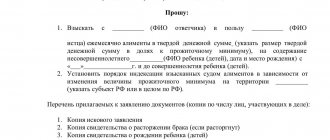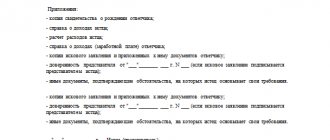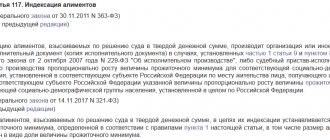On October 1, 2019, global amendments to the Civil Procedure Code of the Russian Federation came into force, regulating the filing and consideration of claims by courts. As is known, courts of general jurisdiction of the first instance (where the claim is initially and essentially considered) are divided into world courts, district courts, and city courts. The magistrates resolve simpler disputes, including through writ proceedings (without calling the parties).
Jurisdiction determines which court (magistrate or district) the interested person applies to. Affected changes from 10/01/2019. and rules for filing applications for the recovery of financial support for children. Further in the article we will understand how the jurisdiction of alimony is determined in 2020-2021: where to file a claim, in a district or magistrate court, in what cases and how to determine them.
Legal assistance:
Free in Russia: 8
Dear readers!
The free legal assistance hotline is available for you 24 hours a day!
How is child support determined in court?
Financial support for a minor child is not a right, but a responsibility of parents. Protection of the interests of children, including property, is entrusted to the mother and father. Therefore, if one of them evades child support, the second is obliged to take all possible methods to recover funds.
The law provides for the following recovery options:
- Voluntary. Based on a notarial agreement.
- Judicial. Based on a court decision.
Going to court is used if the parties are unable to reach an agreement. However, the right of the second parent to go to court in the interests of a minor child is not limited. The court will satisfy the requirements even if a voluntary settlement attempt was not made.
Important! The proper performance of duties by a parent who lives separately from the children is not a reason for refusing a court decision.
Example. Citizen Yu. appealed to the court to recover financial support for the children. However, the father filed an objection to the claim. As arguments, the man indicated the proper performance of duties. The defendant provided evidence (checks and receipts), according to which he regularly transferred funds for the maintenance of children, paid for kindergarten and bought things. However, the court satisfied the plaintiff’s demands, ruling that the court decision would not interfere with continuing to fulfill parental responsibilities.
The following persons have the right to go to court to protect the property interests of a child:
- parent who lives with the child;
- guardian/trustee;
- head of an orphanage;
- adoptive parent;
- specialist of the district guardianship department;
- prosecutor.
Thus, a grandmother or aunt cannot collect child support from one of the parents unless they are properly appointed as guardians.
Adoptive parents are given the obligation to pay financial support to the child, both in case of separation and in case of cancellation of adoption due to their fault. The court may exempt the adoptive parents from paying financial support if the cancellation of adoption occurs at the initiative of the child.
What is the court guided by when determining the child’s place of residence?
We believe that logos-pravo.ru has enough publications, comments and judicial practice on this issue. Let us remind you where to read about this:
- first of all, see the comments to Article 65 of the Family Code of the Russian Federation “Exercising parental rights”;
— paragraph 5 of the Resolution of the Plenum of the Supreme Court of the Russian Federation dated May 27, 1998 N 10 “On the application of legislation by courts in resolving disputes related to the upbringing of children”;
— a review of the practice of courts resolving disputes related to the upbringing of children, approved by the Presidium of the Supreme Court of the Russian Federation on July 20, 2011 (section “Consideration by the courts of cases on determining the place of residence of children when parents live separately”);
— Determination of the child’s place of residence. Claims, agreements. Procedure for exercising parental rights
Jurisdiction: which court hears cases of alimony collection
Collection of financial support has special jurisdiction:
- in case of an application in the interests of a child, documents can be sent to the place of residence of the minor or to the place of residence of the parent.
- in the case of an application in the interests of adult citizens, documents are sent exclusively to the defendant’s place of residence.
You can submit an application for recovery of financial security to the following judicial authorities:
- Magistrates' Court (in the order of writ or claim proceedings).
- District court (as an additional requirement for the cancellation of adoption, deprivation of parental rights and establishment of paternity).
What claims can be made in a claim for divorce?
Either spouse has the right to initiate divorce proceedings, even if the other spouse objects to this. Exceptions to the general rule are contained only in Article 17 of the Family Code of the Russian Federation: the husband does not have the right, without the consent of his wife, to initiate proceedings for divorce during the wife’s pregnancy and within a year after the birth of the child.
As a rule, a spouse who wishes to divorce is not limited to simply requesting a divorce.
The demand for divorce is often associated with other claims:
- on determining the place of residence of a minor child (children);
- on the division of jointly acquired property of spouses;
- on the collection of alimony;
- on determining the order of communication with the child;
- on determining the procedure for exercising parental rights
Parents have the right to present either one of the above requirements or to declare all of the above requirements at once in one statement of claim.
For samples and examples of statements of claim for divorce related to the above requirements, see the publication: “Statements of claim for divorce, division of property, collection of alimony, determination of the child’s place of residence”
However, before reading these sample documents, we recommend that you read some comments on the topic of divorce and related claims in this article.
The procedure and methods for collecting alimony for minor children
You can recover financial support in the following way:
- By order. The most popular recovery option is a writ. This is the easiest way. The applicant prepares a package of documents and an application in 2 copies. After which, the court considers it within 5 days and issues a court order.
A court order is easy to obtain, but challenging is also easy. The defendant can simply petition the court that issued the document to request an annulment. The main condition is compliance with deadlines. You can challenge the order within 10 days.
Important! A prerequisite is the presence of a document about the citizen’s income and place of official employment.
- By way of legal proceedings in the magistrate's court. The method is used to protect the rights of minors in the absence of data on the payer’s earnings and place of work. It can also be applied to the unemployed and entrepreneurs. Filing a claim is possible if the alimony holder challenges the court order. If the applicant wishes to additionally recover funds for the past time, then the application is also submitted in the manner of claim proceedings.
The writ procedure is provided for the collection of funds for minor children. Therefore, when applying for financial support for an adult citizen (disabled relative or pregnant wife), a statement of claim is filed.
- By way of legal proceedings in the district court. Separately, it is necessary to highlight the appeal to the district or city court. This option is provided in the case of filing an application for the resolution of family disputes that are not within the jurisdiction of the magistrate’s court. These include deprivation of parental rights, establishment of paternity and cancellation of adoption. The collection of alimony is provided as an additional requirement.
The case of reducing the amount of alimony
Situation:
Our client’s ex-husband filed a claim in court to reduce the amount of alimony collected from 1/4 to 1/6 of earnings and (or) other income.
In support of the requirements, the plaintiff informed the court that he already pays alimony for his second child in the amount of 1/6 of his income, as well as for the maintenance of his current spouse, and has loan obligations. Objective:
To protect the right of our trustee’s child to receive alimony in the same amount (1/4 of the payer’s income).
Result:
The child’s father’s claims were denied in full. The amount of alimony was left by the court at the same amount.
Decision of the Solomalsky District Court of Arkhangelsk in civil case No. 2-690/2020 dated May 29, 2021
Solombalsky District Court of Arkhangelsk, composed of presiding judge D____ T.S., with secretary M____ T.N.,
having examined in open court in Arkhangelsk a civil case on the claim of K____ Stepan Sergeevich to S____ Irina Evgenievna for a reduction in the amount of alimony, he established:
K____ S.S. filed a lawsuit against S____I.E. to reduce the amount of alimony collected from 1/4 part to 1/6 part of earnings, indicating in support of the stated requirements that alimony was collected from him in the amount of 1/6 part of earnings for the maintenance of the second child.
Plaintiff K____ S.S. did not appear at the court hearing and asked to consider the case in his absence.
Earlier, at the preliminary court hearing, he insisted on the claims and explained that by the decision of the Solombalsky District Court of Arkhangelsk dated April 3, 2014, he was in favor of S____ I.E. Child support was collected from ____ Daniil Stepanovich, ____ year of birth, in the amount of 1/4 of earnings and other income monthly, starting from March 19, 2014, until the child reaches adulthood.
By the decision of the magistrate of judicial district No. 2 of the Solombalsky judicial district of Arkhangelsk in favor of K____ E.L. child support was collected for K____ Mikhail Stepanovich, ____year of birth, in the amount of 1/6 of all types of earnings and other income monthly, starting from July 25, 2021, until the child reaches adulthood, as well as alimony for the maintenance of the spouse K____ EL. in a fixed amount of 6,000 rubles. monthly starting July 25, 2021 until November 27, 2021.
Since the collection of alimony for the maintenance of the first child, the financial and marital status of the plaintiff has changed, firstly - in connection with the birth of the second child and the collection of alimony for his maintenance, secondly in connection with the collection of alimony for the maintenance of the spouse, thirdly - in connection with registration of a mortgage and a loan agreement for the purchase of a car.
Works K____ S.S. in PJSC "____", his income is ____ rubles. monthly, he pays 10,000 rubles for the maintenance of the first child. per month, for the maintenance of a second child - approximately 6000-7000 rubles, 6000 rubles. for spouse support, 9,000 rubles. - a mortgage payment, which is paid jointly with his wife K____ E.L., since the apartment is registered as a common joint property, its payment is 5000-6000 rubles.
There is also a car loan payment.
Currently, the plaintiff and his wife are living separately, the marriage relationship is not working out, K____ EL. currently pregnant, the father is the plaintiff.
Defendant S____ I.E. did not appear at the court hearing, earlier in the preliminary court hearing her representative Nutrikhin M.V. did not agree with the plaintiff’s claims, believes that the mere appearance of the plaintiff’s second child is not grounds for reducing the amount of alimony paid for the first child.
Since the collection of alimony in favor of the defendant, the plaintiff’s financial situation has not worsened, but improved; his salary has become higher.
He also believes that alimony for the maintenance of the plaintiff’s spouse is paid formally and ultimately goes towards repaying the mortgage loan.
S___I.E. works at LLC "____" as a printer, has no children, except for a common child with K____ S.S. Requested in the claim K____ S.S. refuse.
Third party K____ E.L. did not appear at the court hearing, asked to consider the case in her absence, previously supported the claim, explained that with her husband K____ S.S. They have been living separately since November 2021, planning to file for divorce and obtain the status of a low-income family.
Currently, her income consists of: 4000 rubles. — alimony for a child from his first marriage, 6000-7000 rubles. — alimony for the maintenance of a child shared with the plaintiff, 6,000 rubles. - alimony for her maintenance received from K____ S.S.
Most of the income goes to paying off the mortgage (3000-4000 rubles monthly), paying for utilities - 6000-7000 rubles, there is practically no money left, my mother helps, and my husband buys groceries.
Currently expecting the birth of her third child.
Subsequently, on May 26, 2020, she presented to the court a copy of the absentee decision of the magistrate of court district No. 2 of the Solombalsky judicial district of Arkhangelsk dated February 10, 2021, according to which the marriage between her and K____ S.S. terminated
Having examined the case materials, evaluating them in conjunction with the explanations of the parties and a third party, the court comes to the following conclusion.
By virtue of Article 80 of the Family Code of the Russian Federation (hereinafter referred to as the RF IC), parents are obliged to support their minor children.
Paragraph 1 of Article 81 of the RF IC establishes that in the absence of an agreement on the payment of alimony, alimony for minor children is collected by the court from their parents monthly in the amount of: for one child - one quarter, for two children - one third, for three or more children - half of earnings and (or) other income of the parents.
In accordance with Article 119 of the RF IC, if, after the collection of alimony in court, the financial or marital status of one of the parties has changed, the court has the right, at the request of either party, to change the established amount of alimony or to exempt the person obligated to pay it from paying it. In this case, the court may take into account other circumstances worthy of attention.
According to Articles 17, 18 of the Constitution of the Russian Federation, the rights and freedoms of man and citizen are directly applicable and determine the meaning, content and application of laws; the exercise of rights by one person should not violate the rights and freedoms of another person.
The same principle is enshrined in family legislation: by virtue of paragraph 2 of paragraph 1 of Article 7 of the RF IC, the exercise by family members of their rights and the performance of their duties must not violate the rights, freedoms and legitimate interests of other family members and other citizens.
The Plenum of the Supreme Court of the Russian Federation in paragraph 57 of Resolution No. 56 of December 26, 2021 “On the application of legislation by courts when considering cases related to the collection of alimony” explained that when resolving the request of a parent paying alimony for a minor child to reduce the amount of alimony, the court must establish that such changes do not allow him to maintain the payment of alimony in the same amount.
By virtue of the above provisions, when resolving demands to reduce the amount of alimony established by the court, taking into account the provisions of Article 81 of the RF IC, the court must investigate and establish whether the financial and marital status of the person obligated to pay alimony has changed so much that he is currently unable to provide your child with maintenance in the previously established amount, as well as how such a change will affect the child’s financial situation and whether it will significantly affect his interests. If the income of such a person allows him to pay alimony in the previously established amount, maintaining the previous amount of alimony for the maintenance of one child does not indicate an infringement of the rights of another child to his maintenance or a violation of the rights of the person obligated to pay alimony.
In accordance with Part 1 of Article 56 of the Code of Civil Procedure of the Russian Federation, each party must prove the circumstances to which it refers as the basis for its claims and objections, unless otherwise provided by federal law.
By virtue of Part 3 of Article 67 of the Code of Civil Procedure of the Russian Federation, the court evaluates the relevance, admissibility, reliability of each evidence separately, as well as the sufficiency and interconnection of the evidence in its entirety.
As follows from the case materials, the plaintiff and defendant are the parents of K Daniil Stepanovich, b. (copy of birth certificate - ld. 11).
By the decision of the Solombalsky District Court of Arkhangelsk dated April 3, 2014, the plaintiff was in favor of S____ I.E. child support was collected from ____ Daniil Stepanovich, ____year of birth, in the amount of 1/4 of earnings and other income monthly, starting from March 19, 2014, until the child reaches adulthood (copy of the decision - case file 6).
S____ D.S. lives with mother S____ I.E. (copy of apartment card, certificate of family composition - pp. 179, 185).
By the decision of the magistrate of judicial district No. 2 of the Solombalsky judicial district of Arkhangelsk from the plaintiff in favor of K____ E.L. child support was collected for K____ Mikhail Stepanovich, year of birth, in the amount of 1/6 of all types of earnings and other income monthly, starting from July 25, 2021, until the child reaches adulthood, as well as alimony for the maintenance of the spouse of K____ E.L. in a fixed amount of 6,000 rubles. monthly, starting from July 25, 2021 until November 27, 2021 (case sheet 7).
At the court hearing it was established that the plaintiff was employed at PJSC "____" and had a stable income.
In 2021, the average monthly earnings of K____ S.S. according to the submitted income certificates, less personal income tax, amounted to ____ rubles, in 2021 - ____ rubles, in 2021 - _____ rubles. (ld. 120-125).
In 2021 and 2021 The plaintiff’s expenses consisted of paying alimony for the maintenance of S____ Daniil in the form of 1/4 of the income, namely, the amount of expenses averaged from ____ rub. up to ____ rub.
Thus, at the disposal of K____ S.S. After paying alimony, RUB remained monthly in 2021.
According to the documents presented by the plaintiff, on December 29, 2021, a mortgage agreement was drawn up (case sheet 76-78).
The co-borrowers on the loan are K____ Ekaterina Lvovna and K____ Stepan Sergeevich.
Currently, the mortgage payment is about ____ rubles, as explained by the plaintiff and the third party, K____ S.S. contributes ____ rub. monthly, K____ E.L. - ____ rub.
June 30, 2021 K____ S.S. a car loan has been issued, the payment for which is ____ rubles. (ld. 127-129).
Alimony paid in favor of the defendant for the maintenance of K____ Daniil averaged 16,000 rubles in 2021. monthly, in 2020 until April - an average of 15,000 rubles. monthly (statements of the defendant’s account - pp. 141 - 178).
Alimony in favor of a third party is about 6000-7000 rubles. monthly, for the maintenance of the spouse - 6,000 rubles. monthly.
Thus, currently at the disposal of K____ S.S. after paying alimony and loan payments, about 23,000 rubles remain, about 29,000 rubles are left for paying alimony, and 13,000 rubles for paying off loans.
That is, compared to 2021, the amount of material maintenance of K S.S. decreased by 17,000 rubles, compared to 2018 - by approximately 11,000 rubles.
The defendant's income in 2021 averaged 6,900 rubles. per month, in 2021 - about 7,500 rubles. plus child support is about 13,400 rubles, that is, in general - almost 21,000 rubles. In 2019, 9,600 rubles. plus alimony 16,000 rubles, i.e. RUB 25,600 (ld. 180-184).
Thus, child support remained almost at the same level compared to 2021.
When resolving the dispute, the court also takes into account that the plaintiff from the remaining 23,000 rubles, and the defendant from 25,000 rubles. are required to pay utility bills.
It is also taken into account that the plaintiff has the right of common joint ownership with K____ E.L. apartment at the address: Arkhangelsk, st. ____, d. __, bldg. __, sq.__, and a Toyota car, manufactured in 2008, which is not an essential item, and when planning the purchase, the plaintiff had to count on the ability to fulfill the loan obligation.
Based on the foregoing, the court comes to the conclusion that K____S.S., despite the fact that his financial and family situation has changed, his financial situation is in the direction of decreasing income attributable to him personally, the remaining amount of 23,000 rubles. enough to support yourself financially.
The court also proceeds from the fact that the child needs to be provided with the same level of maintenance if such an opportunity exists, and this will be preserved if alimony is paid in the amount of 1/4 of the plaintiff’s income.
In addition, a decrease in the amount of alimony in favor of the first child will not entail an increase in the amount of support for the second child.
This issue must be resolved by K____ E.L., including taking into account her financial situation.
Under all these circumstances, the claim of K____ S.S. a request to reduce the amount of alimony is not subject to satisfaction.
Guided by Art. Art. 194-199,233-237 Code of Civil Procedure of the Russian Federation, decided:
The claim of K____ Stepan Sergeevich against S____ Irina Evgenievna to reduce the amount of alimony collected for the maintenance of the child of K____ Daniil Stepanovich is refused.
The court decision can be appealed to the Arkhangelsk Regional Court through the Solombalsky District Court of Arkhangelsk within one month from the date of the decision.
Documents to court
The list of documentation depends on the specific situation and type of application.
To apply for a court order you must attach:
- the applicant's civil passport;
- birth document of a minor;
- information about the income of the alimony provider;
- certificate of family composition;
- child's passport (if available).
If the application is not submitted by a parent, then additional documentation confirming the authority is attached:
- certificate of a guardian or trustee;
- foster parent's certificate;
- guardianship order;
- an agreement on the transfer of a minor to a foster family;
- order for placement under supervision in an orphanage;
- power of attorney from the district guardianship department.
If the application is submitted in the manner of legal proceedings, then additionally attached:
- petition to request missing information;
- evidence of the need for funds;
- calculation of costs for a child;
- information about the customer's income.
When sending an application to a district or city court, it is necessary to substantiate the main claims. This will require additional evidence.
Divorce through court
If the spouse does not agree to divorce and/or there are children under 18 years of age, only divorce through the court is permissible (according to Article 21 of the RF IC). A person interested in legal proceedings needs to know how to resolve controversial issues regarding the union, alimony, and how to draw up and file a claim.
Divorce through the registry office is also permissible in cases where a couple has children together or one of the spouses does not agree to end the marriage, but the husband/wife:
- are considered missing;
- are incompetent or mentally ill;
- are in prison (sentenced to more than three years).
If necessary, in the division of property, all the details can be written down in the claim and resolved immediately. But keep in mind that the duration of the trial in this case will be longer. If a quick divorce is your priority, you should postpone the division of property until later, and now focus on collecting child support. Additionally, the following issues can be resolved:
- about material content;
- about raising children;
- determining where the child will live;
- on the maintenance of a husband/wife (only a dependent, a disabled person caring for a disabled child or a baby under three years old, a pregnant wife).
Time limits for collecting child support
The period directly depends on the type of application and the method of application.
Possible options
| No. | Option | Term |
| 1 | Application for a court order | 5 days |
| 2 | Statement of claim to the magistrate's court | 30 days |
| 3 | Statement of claim to the district/city court | from 2 months |
You can go to court at any time. The statute of limitations does not apply to the collection of alimony payments. The main condition is the presence of grounds.
Expert opinion
Stanislav Evseev
Lawyer. Experience 12 years. Specialization: civil, family, inheritance law.
Therefore, the mother can recover funds from the father for the child until he comes of age. And for a disabled relative, the payment may be withheld during the period of incapacity and need. In addition, the financial capabilities of the payer are taken into account.
The law establishes the possibility of withholding funds from the moment the application is submitted, but also for the past time. The maximum period is 3 years. However, the applicant must prove that he took measures to collect financial security, and the alimony provider avoided resolving the issue.
Area of jurisdiction
Collection of payments has a wide area of jurisdiction. The most common situations include:
- Cases regarding the collection of alimony in a shared ratio:
- if you have official income;
- if the salary is below the subsistence level;
- in the absence of a permanent place of work (receiving salary “in envelopes”).
- Alimony in a “flat amount”:
- on the basis of the debtor’s own initiative;
- at the request of the main alimony recipient;
- the possibility of combining a “flat amount” with shared contributions;
- the correctness of establishing payments if the debtor receives a salary in the currency of another country, the equivalent in kind.
- Indexation of alimony:
- rules for carrying out the indexation procedure for past periods in the absence of the alimony payer’s fault;
- procedural aspects of the issue.
- Cases regarding the collection of alimony for several children from the same or different marriages (procedure, establishment of amounts, terms of debt repayment).
Every day, courts of various instances consider applications for the collection of alimony in accordance with the current situation and circumstances. All of them are individual in nature and cover different areas of jurisdiction for alimony. The issue is regulated on the basis of normative acts of family law, civil procedural legislation, etc.
Procedure for paying alimony
The Family Code establishes the following options for paying for material support:
- Percentage ratio to the payer’s income (applies only when collecting funds for minor children). Art. The RF IC provides for withholding a share of income depending on the number of children. For example, for 1 child you need to deduct ¼ share of income. For 2 children 33% is paid. If the payer has 3 or more minor children, then ½ share is withheld.
- Flat amount (used primarily for adult recipients). For children it is used as a last resort. For example, if the payer has no regular income. Or if you have additional unstable income (rotation work, entrepreneurship). The calculation of the amount is based on the applicant's income and expenses. In addition, the court takes into account the needs of the payer. He must be able to provide for his own needs after making payments.
- Settlement of property. At the initiative of the payer, it is possible to transfer valuable property into the child’s ownership to offset payments. The advantage of this option is that there is no need for monthly payments. However, this option is only possible with the consent of the buyer.
State duty amount
For 2021, the amount of state duty is 600 rubles. This amount is paid only for filing a divorce claim. If it additionally specifies requirements, then the size is determined depending on their type/quantity:
- to collect alimony for both husband/wife and child - an additional payment of 150 rubles is required. (sometimes assigned to the defendant);
- requirements of a non-material nature (deprivation or imposition of restrictions on parental rights, determination of the child’s place of residence, etc.) - an additional 300 rubles. for each of the requirements;
- division of property - the amount of the duty will depend on the total estimated value of the property and assets that are supposed to be divided. If this cost is less than 20,000 rubles, you will have to pay 4% of the “claim price”, but not less than 400 rubles. When dividing property worth up to 100,000 rubles, the duty is calculated according to the formula 800 rubles. + 3% of that part of the claim price that exceeds RUB 20,000. If the divisible property is valued at up to 200,000 rubles, then the duty will be 3,200 rubles. + 2% of the share of the claim price exceeding RUB 100,000. When assets worth more than 200,000 and less than 1,000,000 rubles are divided, the duty will be equal to 5,200 rubles. + 1% of the portion of the claim price exceeding RUB 200,000. Finally, when the estimated value of the divisible assets exceeds RUB 1,000,000, an amount equal to RUB 13,200 will have to be paid. + 0.5% of that part of the claim price that exceeds RUB 1,000,000.
A sample of bank details for payment can be obtained from the court office. And providing a receipt is mandatory. This shows that the person has completed everything and has the right to receive a court decision.
The decision to divorce and collect alimony always rests with the court, and by submitting your information, you agree to this. If there is clear evidence, the plaintiff’s task is to collect it in order to gain an advantage over the defendant.
If you need help sorting out the details of your divorce claim or have a question for an attorney, you can get a free consultation from a qualified professional. And remember that the maintenance of their minor children is the responsibility of the parents, regardless of where the father/mother is located and whether their marriage is officially registered. You won't be able to refuse.





